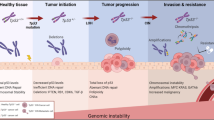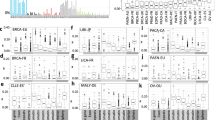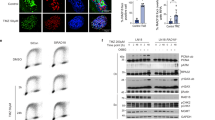Abstract
Loss of the DNA mismatch repair (MMR) protein MSH3 leads to the development of a variety of tumors in mice without significantly affecting survival rates, suggesting a modulating role for the MutSβ (MSH2-MSH3) complex in late-onset tumorigenesis. To better study the role of MSH3 in tumor progression, we crossed Msh3−/− mice onto a tumor predisposing p53-deficient background. Survival of Msh3/p53 mice was not reduced compared with p53 single mutant mice; however, the tumor spectrum changed significantly from lymphoma to sarcoma, indicating MSH3 as a potent modulator of p53-driven tumorigenesis. Interestingly, Msh3−/− mouse embryonic fibroblasts displayed increased chromatid breaks and persistence of γH2AX foci following ionizing radiation, indicating a defect in DNA double-strand break repair (DSBR). Msh3/p53 tumors showed increased loss of heterozygosity, elevated genome-wide copy-number variation and a moderate microsatellite instability phenotype compared with Msh2/p53 tumors, revealing that MSH2-MSH3 suppresses tumorigenesis by maintaining chromosomal stability. Our results show that the MSH2-MSH3 complex is important for the suppression of late-onset tumors due to its roles in DNA DSBR as well as in DNA MMR. Further, they demonstrate that MSH2-MSH3 suppresses chromosomal instability and modulates the tumor spectrum in p53-deficient tumorigenesis and possibly has a role in other chromosomally unstable tumors as well.
This is a preview of subscription content, access via your institution
Access options
Subscribe to this journal
Receive 50 print issues and online access
$259.00 per year
only $5.18 per issue
Buy this article
- Purchase on Springer Link
- Instant access to full article PDF
Prices may be subject to local taxes which are calculated during checkout





Similar content being viewed by others
References
Iyer RR, Pluciennik A, Burdett V, Modrich PL . DNA mismatch repair: functions and mechanisms. Chem Rev 2006; 106: 302–323.
Marsischky GT, Kolodner RD . Biochemical characterization of the interaction between the Saccharomyces cerevisiae MSH2-MSH6 complex and mispaired bases in DNA. J Biol Chem 1999; 274: 26668–26682.
Plaschke J, Kruger S, Jeske B, Theissig F, Kreuz FR, Pistorius S et al. Loss of MSH3 protein expression is frequent in MLH1-deficient colorectal cancer and is associated with disease progression. Cancer Res 2004; 64: 864–870.
Evans E, Sugawara N, Haber JE, Alani E . The Saccharomyces cerevisiae Msh2 mismatch repair protein localizes to recombination intermediates in vivo. Mol cell 2000; 5: 789–799.
Sugawara N, Paques F, Colaiacovo M, Haber JE . Role of Saccharomyces cerevisiae Msh2 and Msh3 repair proteins in double-strand break-induced recombination. Proc Natl Acad Sci USA 1997; 94: 9214–9219.
Lyndaker AM, Alani E . A tale of tails: insights into the coordination of 3' end processing during homologous recombination. Bioessays 2009; 31: 315–321.
Kumar C, Williams GM, Havens B, Dinicola M, Surtees JA . Distinct requirements within the Msh3 nucleotide binding pocket for mismatch and double-strand break repair. J Mol Biol 2013; 425: 1881–1898.
Manley K, Shirley TL, Flaherty L, Messer A . Msh2 deficiency prevents in vivo somatic instability of the CAG repeat in Huntington disease transgenic mice. Nature Genet 1999; 23: 471–473.
Owen BA, Yang Z, Lai M, Gajec M, Badger JD 2nd, Hayes JJ et al. (CAG)(n)-hairpin DNA binds to Msh2-Msh3 and changes properties of mismatch recognition. Nat Struct Mol Biol 2005; 12: 663–670.
Savouret C, Brisson E, Essers J, Kanaar R, Pastink A, te Riele H et al. CTG repeat instability and size variation timing in DNA repair-deficient mice. EMBO J 2003; 22: 2264–2273.
van den Broek WJ, Nelen MR, Wansink DG, Coerwinkel MM, te Riele H, Groenen PJ et al. Somatic expansion behaviour of the (CTG)n repeat in myotonic dystrophy knock-in mice is differentially affected by Msh3 and Msh6 mismatch-repair proteins. Hum Mol Genet 2002; 11: 191–198.
Tome S, Holt I, Edelmann W, Morris GE, Munnich A, Pearson CE et al. MSH2 ATPase domain mutation affects CTG*CAG repeat instability in transgenic mice. PLoS Genet 2009; 5: e1000482.
Edelmann W, Umar A, Yang K, Heyer J, Kucherlapati M, Lia M et al. The DNA mismatch repair genes Msh3 and Msh6 cooperate in intestinal tumor suppression. Cancer Res 2000; 60: 803–807.
Plaschke J, Preussler M, Ziegler A, Schackert HK . Aberrant protein expression and frequent allelic loss of MSH3 in colorectal cancer with low-level microsatellite instability. Int J Colorectal Dis 2012; 27: 911–919.
Haugen AC, Goel A, Yamada K, Marra G, Nguyen TP, Nagasaka T et al. Genetic instability caused by loss of MutS homologue 3 in human colorectal cancer. Cancer Res 2008; 68: 8465–8472.
Lee SY, Chung H, Devaraj B, Iwaizumi M, Han HS, Hwang DY et al. Microsatellite alterations at selected tetranucleotide repeats are associated with morphologies of colorectal neoplasias. Gastroenterol 2010; 139: 1519–1525.
Benachenhou N, Guiral S, Gorska-Flipot I, Labuda D, Sinnett D . High resolution deletion mapping reveals frequent allelic losses at the DNA mismatch repair loci hMLH1 and hMSH3 in non-small cell lung cancer. Int J Cancer 1998; 77: 173–180.
Kawakami T, Shiina H, Igawa M, Deguchi M, Nakajima K, Ogishima T et al. Inactivation of the hMSH3 mismatch repair gene in bladder cancer. Biochem Biophys Res Comm 2004; 325: 934–942.
Benachenhou N, Guiral S, Gorska-Flipot I, Labuda D, Sinnett D . Frequent loss of heterozygosity at the DNA mismatch-repair loci hMLH1 and hMSH3 in sporadic breast cancer. BrJ Cancer 1999; 79: 1012–1017.
Berndt SI, Platz EA, Fallin MD, Thuita LW, Hoffman SC, Helzlsouer KJ . Mismatch repair polymorphisms and the risk of colorectal cancer. Int J cancer 2007; 120: 1548–1554.
Orimo H, Nakajima E, Yamamoto M, Ikejima M, Emi M, Shimada T . Association between single nucleotide polymorphisms in the hMSH3 gene and sporadic colon cancer with microsatellite instability. J Hum Genet 2000; 45: 228–230.
Hirata H, Hinoda Y, Kawamoto K, Kikuno N, Suehiro Y, Okayama N et al. Mismatch repair gene MSH3 polymorphism is associated with the risk of sporadic prostate cancer. J Urol 2008; 179: 2020–2024.
Michiels S, Danoy P, Dessen P, Bera A, Boulet T, Bouchardy C et al. Polymorphism discovery in 62 DNA repair genes and haplotype associations with risks for lung and head and neck cancers. Carcinogenesis 2007; 28: 1731–1739.
Tome S, Simard JP, Slean MM, Holt I, Morris GE, Wojciechowicz K et al. Tissue-specific mismatch repair protein expression: MSH3 is higher than MSH6 in multiple mouse tissues. DNA repair 2013; 12: 46–52.
Cranston A, Bocker T, Reitmair A, Palazzo J, Wilson T, Mak T et al. Female embryonic lethality in mice nullizygous for both Msh2 and p53. Nature Genet 1997; 17: 114–118.
Reitmair AH, Schmits R, Ewel A, Bapat B, Redston M, Mitri A et al. MSH2 deficient mice are viable and susceptible to lymphoid tumours. Nature Genet 1995; 11: 64–70.
de Wind N, Dekker M, Berns A, Radman M, te Riele H . Inactivation of the mouse Msh2 gene results in mismatch repair deficiency, methylation tolerance, hyperrecombination, and predisposition to cancer. Cell 1995; 82: 321–330.
Smits R, Hofland N, Edelmann W, Geugien M, Jagmohan-Changur S, Albuquerque C et al. Somatic Apc mutations are selected upon their capacity to inactivate the beta-catenin downregulating activity. Genes Chromosomes Cancer 2000; 29: 229–239.
Toft NJ, Curtis LJ, Sansom OJ, Leitch AL, Wyllie AH, te Riele H et al. Heterozygosity for p53 promotes microsatellite instability and tumorigenesis on a Msh2 deficient background. Oncogene 2002; 21: 6299–6306.
Jacks T . Lessons from the p53 mutant mouse. J Cancer Res Clin Oncol 1996; 122: 319–327.
Miura T, Yamana Y, Usui T, Ogawa HI, Yamamoto MT, Kusano K . Homologous recombination via synthesis-dependent strand annealing in yeast requires the Irc20 and Srs2 DNA helicases. Genetics 2012; 191: 65–78.
Chen PC, Dudley S, Hagen W, Dizon D, Paxton L, Reichow D et al. Contributions by MutL homologues Mlh3 and Pms2 to DNA mismatch repair and tumor suppression in the mouse. Cancer Res 2005; 65: 8662–8670.
Bardwell PD, Woo CJ, Wei K, Li Z, Martin A, Sack SZ et al. Altered somatic hypermutation and reduced class-switch recombination in exonuclease 1-mutant mice. Nat Immunol 2004; 5: 224–229.
Li Z, Peled JU, Zhao C, Svetlanov A, Ronai D, Cohen PE et al. A role for Mlh3 in somatic hypermutation. DNA Repair 2006; 5: 675–682.
Li Z, Scherer SJ, Ronai D, Iglesias-Ussel MD, Peled JU, Bardwell PD et al. Examination of Msh6- and Msh3-deficient mice in class switching reveals overlapping and distinct roles of MutS homologues in antibody diversification. J Exp Med 2004; 200: 47–59.
Wu X, Tsai CY, Patam MB, Zan H, Chen JP, Lipkin SM et al. A role for the MutL mismatch repair Mlh3 protein in immunoglobulin class switch DNA recombination and somatic hypermutation. J Immunol 2006; 176: 5426–5437.
Svetlanov A, Baudat F, Cohen PE, de Massy B . Distinct functions of MLH3 at recombination hot spots in the mouse. Genetics 2008; 178: 1937–1945.
Tomimatsu N, Mukherjee B, Deland K, Kurimasa A, Bolderson E, Khanna KK et al. Exo1 plays a major role in DNA end resection in humans and influences double-strand break repair and damage signaling decisions. DNA Repair 2012; 11: 441–448.
Kuraguchi M, Yang K, Wong E, Avdievich E, Fan K, Kolodner RD et al. The distinct spectra of tumor-associated Apc mutations in mismatch repair-deficient Apc1638N mice define the roles of MSH3 and MSH6 in DNA repair and intestinal tumorigenesis. Cancer Res 2001; 61: 7934–7942.
Fukasawa K, Choi T, Kuriyama R, Rulong S, Vande Woude GF . Abnormal centrosome amplification in the absence of p53. Science 1996; 271: 1744–1747.
Tomasini R, Mak TW, Melino G . The impact of p53 and p73 on aneuploidy and cancer. Trends Cell Biol 2008; 18: 244–252.
Wang Y, Zhang W, Edelmann L, Kolodner RD, Kucherlapati R, Edelmann W . Cis lethal genetic interactions attenuate and alter p53 tumorigenesis. Proc Natl Acad Sci USA 2010; 107: 5511–5515.
Harrington JM, Kolodner RD . Saccharomyces cerevisiae Msh2-Msh3 acts in repair of base-base mispairs. Mol Cell Biol 2007; 27: 6546–6554.
Hong Z, Jiang J, Hashiguchi K, Hoshi M, Lan L, Yasui A . Recruitment of mismatch repair proteins to the site of DNA damage in human cells. J Cell Sci 2008; 121 (Pt 19): 3146–3154.
Reynolds MF, Peterson-Roth EC, Bespalov IA, Johnston T, Gurel VM, Menard HL et al. Rapid DNA double-strand breaks resulting from processing of Cr-DNA cross-links by both MutS dimers. Cancer Res 2009; 69: 1071–1079.
Pino MS, Chung DC . The chromosomal instability pathway in colon cancer. Gastroenterology 2010; 138: 2059–2072.
Edelmann W, Yang K, Umar A, Heyer J, Lau K, Fan K et al. Mutation in the mismatch repair gene Msh6 causes cancer susceptibility. Cell 1997; 91: 467–477.
Jacks T, Remington L, Williams BO, Schmitt EM, Halachmi S, Bronson RT et al. Tumor spectrum analysis in p53-mutant mice. Curr Biol 1994; 4: 1–7.
Varela I, Klijn C, Stephens PJ, Mudie LJ, Stebbings L, Galappaththige D et al. Somatic structural rearrangements in genetically engineered mouse mammary tumors. Genome Biol 2010; 11: R100.
Peled JU, Sellers RS, Iglesias-Ussel MD, Shin DM, Montagna C, Zhao C et al. Msh6 protects mature B cells from lymphoma by preserving genomic stability. Am J Pathol 2010; 1775: 2597–2608.
Schrock E, du Manoir S, Veldman T, Schoell B, Wienberg J, Ferguson-Smith MA et al. Multicolor spectral karyotyping of human chromosomes. Science 1996; 273: 494–497.
Rousseeuw PJ . Silhouettes: A graphical aid to the interpretation and validation of cluster analysis. J Comput Appl Math 1987; 20: 53–65.
Acknowledgements
We thank Rani Sellers from the Einstein Histotechnology and Comparative Pathology facility for mouse pathology and for reviewing the manuscript. This study was supported by National Institutes of Health grants CA76329 and CA93484 (WE), and CA72649 and CA102705 (MDS). MDS is supported by the Harry Eagle Chair provided by the National Women's Division of the Albert Einstein College of Medicine.
Author information
Authors and Affiliations
Corresponding author
Ethics declarations
Competing interests
The authors declare no conflict of interest.
Additional information
Supplementary Information accompanies this paper on the Oncogene website
Rights and permissions
About this article
Cite this article
van Oers, J., Edwards, Y., Chahwan, R. et al. The MutSβ complex is a modulator of p53-driven tumorigenesis through its functions in both DNA double-strand break repair and mismatch repair. Oncogene 33, 3939–3946 (2014). https://doi.org/10.1038/onc.2013.365
Received:
Revised:
Accepted:
Published:
Issue Date:
DOI: https://doi.org/10.1038/onc.2013.365
Keywords
This article is cited by
-
Dietary methyl donor nutrients, DNA mismatch repair polymorphisms, and risk of colorectal cancer based on microsatellite instability status
European Journal of Nutrition (2022)
-
Profiling diverse sequence tandem repeats in colorectal cancer reveals co-occurrence of microsatellite and chromosomal instability involving Chromosome 8
Genome Medicine (2021)
-
Loss of MSH2 and MSH6 due to heterozygous germline defects in MSH3 and MSH6
Familial Cancer (2017)
-
Microsatellite Instability Pathway and EMAST in Colorectal Cancer
Current Colorectal Cancer Reports (2017)
-
Deep genome sequencing and variation analysis of 13 inbred mouse strains defines candidate phenotypic alleles, private variation and homozygous truncating mutations
Genome Biology (2016)



